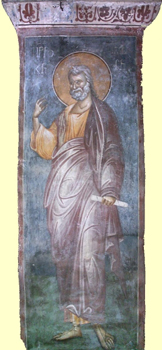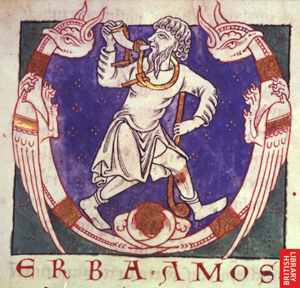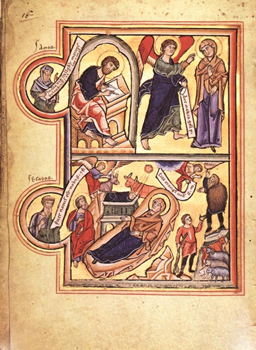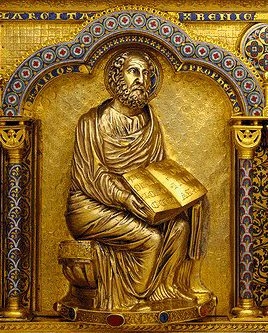For Sunday July 12, 2015
Lectionary Readings (Revised Common Lectionary, Year B)
2 Samuel 6:1–5, 12b–19 or Amos 7:7–15
Psalm 24 or Psalm 85:8–13
Ephesians 1:3–14
Mark 6:14–29
It's hard to read Mark 6 about the beheading of John the Baptist and not think about the grotesque images of ISIS. Whatever else ISIS is doing, it's pimping religion for a political cause.
And that's exactly what this week's reading from Amos is about.
Amos wrote 2,800 years ago, but his prophecy reads like today's newspaper. He lived under king Jeroboam II, who reigned for forty-one years (786–746 BC). Jeroboam's kingdom was characterized by territorial expansion, aggressive militarism, and unprecedented economic prosperity.
Times were good. Or so people thought.
The people of the day interpreted their good fortune as God's favor. Amos says that the people were intensely and sincerely religious.
But theirs was a privatized religion of personal benefit. They ignored the poor, the widow, the alien, and the orphan. Their form of religion degraded faith to culturally acceptable rituals.
 |
|
Amos, column painting, Serbian monastery, 14th century.
|
Making things worse, Israel's religious leaders sanctioned the political and economic status quo. They pimped their religion for Jeroboam's empire.
Enter Amos. Amos preached from the pessimistic and unpatriotic fringe. He was blue collar rather than blue blooded. He admits that he was neither a prophet nor even the son of a prophet in the professional sense of the term.
Amos was a shepherd, a farmer, and a tender of fig trees. He was a small town boy who grew up in Tekoa, about twelve miles southeast of Jerusalem and five miles south of Bethlehem. The cultured elites despised him as a redneck.
Furthermore, he was an unwelcome outsider. Born in the southern kingdom of Judah, God called him to thunder a prophetic word to the northern kingdom of Israel.
And that's what this rough hewn prophet did. He opposed the political powers of his day and the religious stooges who supported them.
With graphic details that make you wince, Amos describes how the rich crushed the poor; the affluent with their expensive lotions, elaborate music, and vacation homes with beds of inlaid ivory; sexual debauchery in which a man and his son abused the same woman; a corrupt legal system that sold justice to the highest bidder; predatory lenders who exploited vulnerable families; and religious leaders who sanctioned it all.
 |
|
Amos with shepherd's staff and horn, 12th century Park Abbey Bible.
|
This week's reading from Amos 7:7–17 relates one of the most dramatic encounters in all of Scripture. The text ought to come with warning labels like "not recommended for children," or "side effects include severe political discomfort."
To the priests who defended, legitimized, and justified Jeroboam's corrupt kingdom, Amos delivered an uncompromising word of warning.
After Amaziah the priest informed Jeroboam that Amos's preaching was unpatriotic and seditious, he tried to run him out of town. “Get out, you seer! Go back to the land of Judah. Earn your bread there and do your prophesying there.” (7:12).
Then Amaziah said something that reveals how completely he had identified religious faith with political power and economic gain. It ought to send a chill up the spine of every religious leader who ever thought about sucking up to political power: "Don't prophesy anymore at Bethel, because this is the king's sanctuary and the temple of the kingdom." (7:13).
With those words, the religious justification of political empire is complete, and faith is reduced to patriotic cheer-leading.
But Amos wouldn't be bullied. He had a word of his own for every priest who pimped religion for empire: "Your wife will become a whore, your kids will be violently murdered, enemies will carve up the country, you will die far from home, and pagan Assyria will devour the corrupt political and economic empire you have sanctioned in God's name" (7:17).
 |
|
Amos preaching, 13th-century Prayerbook of Elizabeth of York.
|
The church has a checkered history in its relationship to the state. Some have followed Amaziah and traded religious legitimation for security, power and privilege—the German Christian movement that supported Nazi ideology, the Dutch Reformed church that supported apartheid in South Africa, and Russian Orthodox priests who collaborated with the Soviet KGB.
But there are also many inspirational examples. The Archbishop and martyr of San Salvador, Óscar Romero (d. 1980), wrote a letter to President Jimmy Carter that he could have sent to any number of our military or political leaders: "You say that you are Christian. If you are really Christian, please stop sending military aid to the military here, because they use it only to kill my people."
Romero is only one of many brave saints who chose Amos over Amaziah. Consider the Confessing Church in Germany that opposed Hitler, nationalism, and anti-Semitism; the black pentecostal pastor Frank Chikane who in 1985 gathered more than 150 clergy from 20 denominations to draft the Kairos Document that protested South African apartheid; father Gleb Yakunin who insisted that the Russian Orthodox Church publicly repent of its ties to the Soviet regime; the culturally marginal and politically powerless Quakers who helped to abolish the British slave trade in the 19th century; and Morgan Tsvangirai who sought "divine intervention" to end Robert Mugabe's three decades of thugocracy in Zimbabwe.
 |
|
Amos, Cologne Cathedral, 12th century.
|
There's the Jesuit priest Daniel Berrigan (b. 1921), who did time in prison for his civil disobedience against American policies on racism, nuclear proliferation, and Vietnam (he is also pro-life). When asked by Nora Gallagher how many times he had been jailed for subverting caesar because of Jesus, Berrigan responded, "Not enough."
Dan's younger brother Phil (1923–2002), also a Catholic priest, was arrested more than 100 times and served a total of 11 years in prison for acting on his conviction that the good news of Jesus sometimes subverts the demands of the state:
"It's spelled out in Scripture, it could not possibly be more clear. It's spelled out in the wisdom of Isaiah, with its injunction to beat swords into plowshares and to learn war no more. To be acceptable to God, it says, we must forsake our weapons, destroy them, live as brothers and sisters in peace and love. Christians do not hate, Christians do not kill, Christians love their enemies. It's difficult… But I do know that being a Christian is about non-violence. It's about justice. It's about being outraged at the way we destroy each other."
In the language of the lectionary, it's about choosing Amos over Amaziah.
Image credits: (1–4) Bibelwissenschaft.de.





